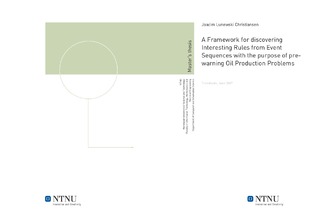A Framework for discovering Interesting Rules from Event Sequences with the purpose of pre-warning Oil Production Problems
Abstract
Periods of sub-optimal production rates, or complete shut-downs, add negative numbers to the revenue graph for oil companies. Oil and gas are produced from several reservoirs and through many wells with varying gas/oil proportion, making it a complex process that is difficult to control. As a part of a three step process for utilizing data in the oil production domain, this thesis derive methods for discovering event patterns, called restricted association rules, from time series in order to pre-warn about future problems in oil production processes. A restricted rule syntax and semantics is derived to explicitly target rules suited for prediction. Based on the defined rule syntax, a two step process is derived where restricted rule mining based on the concept of minimal occurrences is used to discover restricted association rules from a sequence of events. Next, redundant rules are removed based on the concept of minimum improvement and chaining of rules, during a rule selection phase. Information theory is applied in order to identify the most interesting rules, which can be submitted to an expert for validation. Both a simple solution for easy implementation in ConocoPhillips and a more advanced solution appropriate for general prediction cases are derived. This thesis concludes that it is feasible to discover dependencies between events from actual process data. It is also concluded that a large number of rules can be pruned, in order to get a manageable set of rules which is believed to have good predictive performance.
